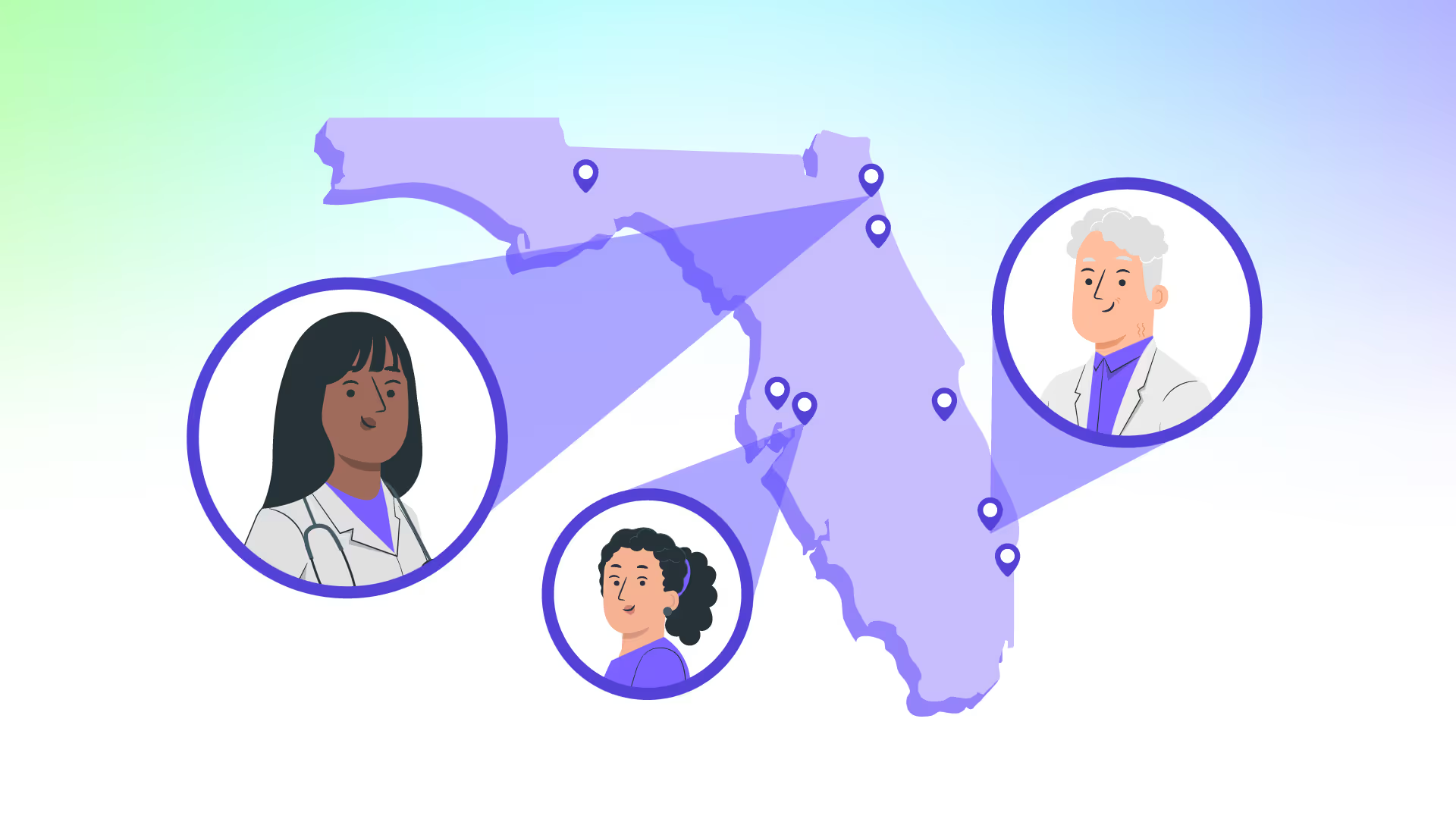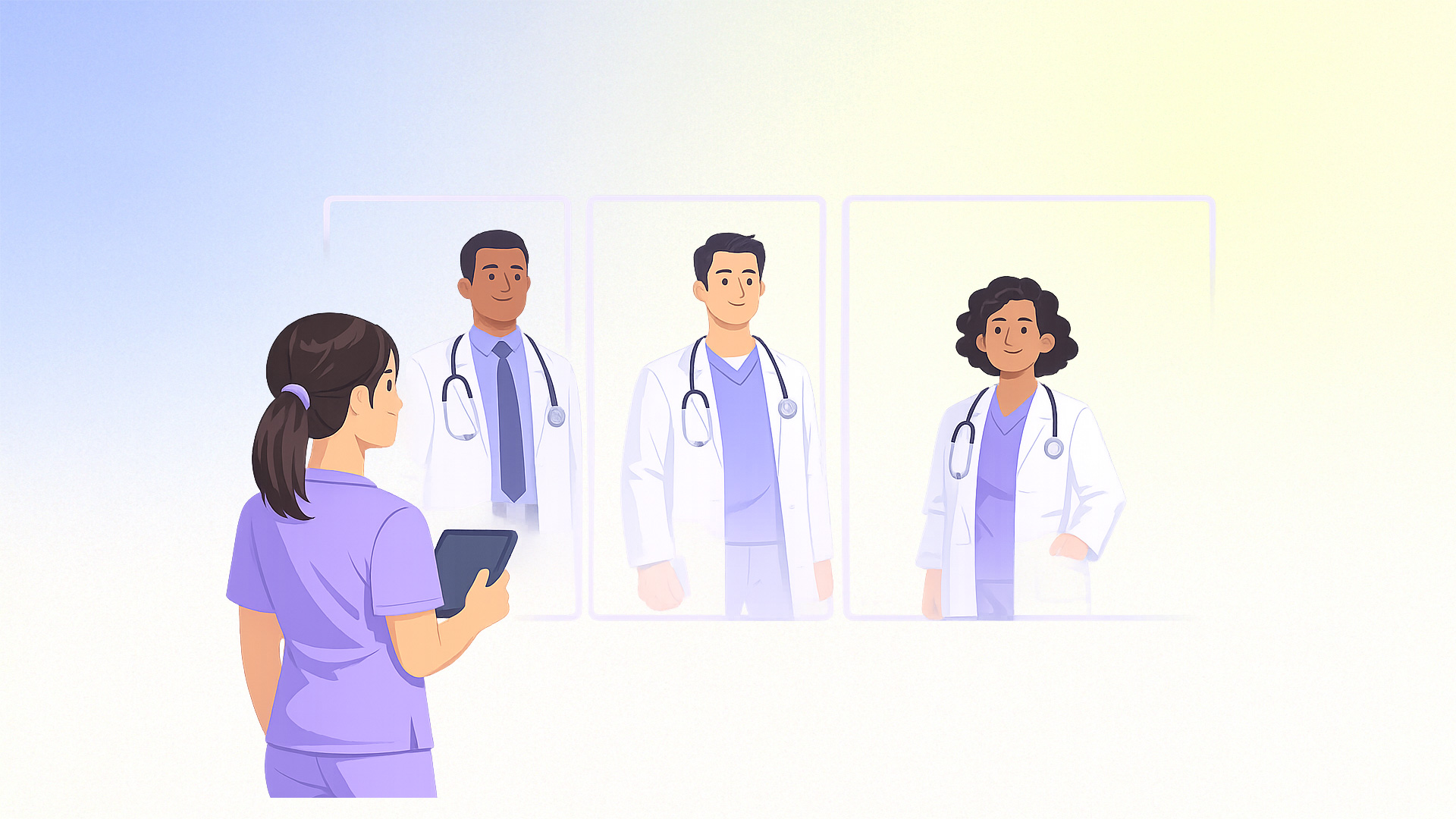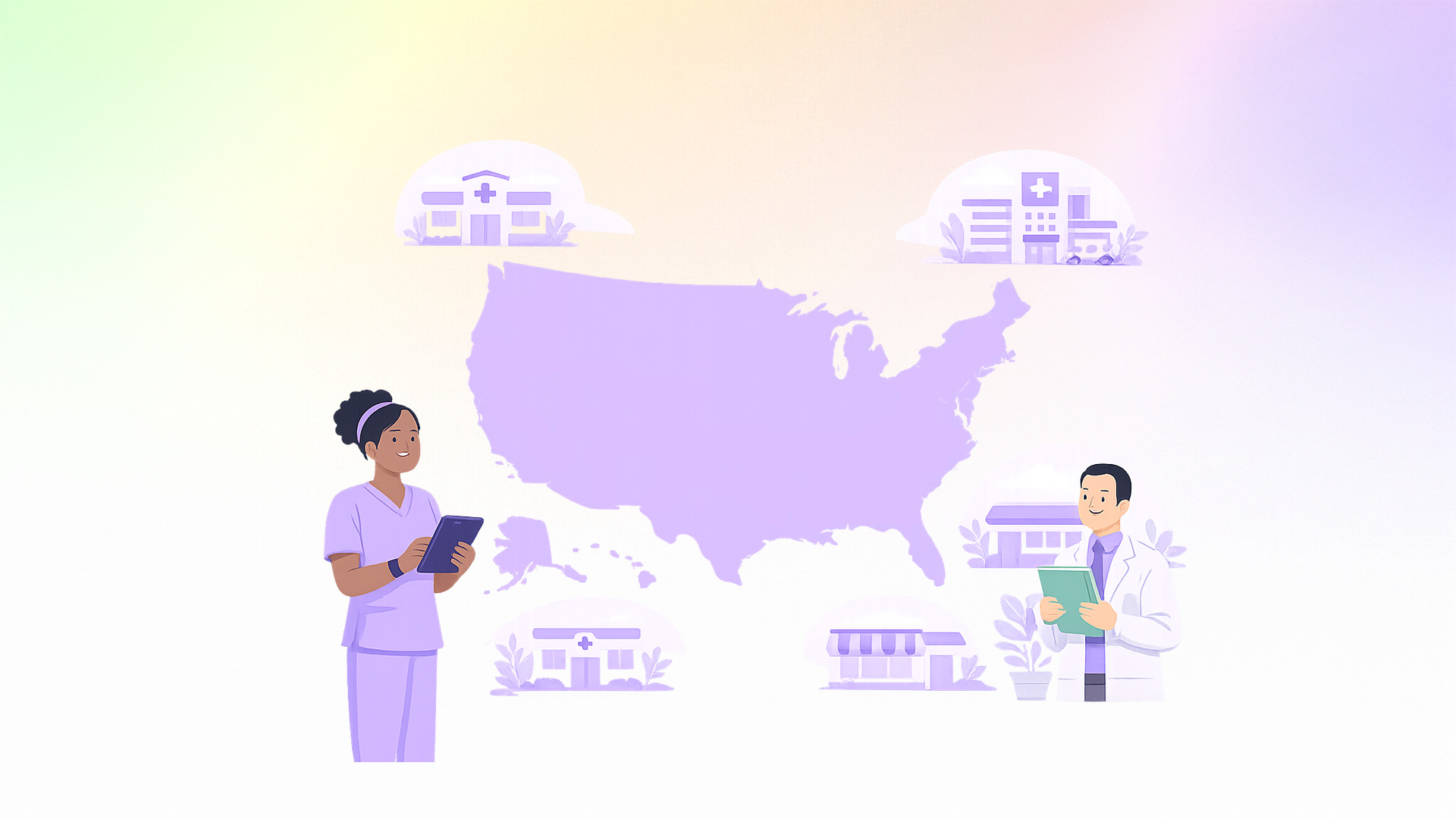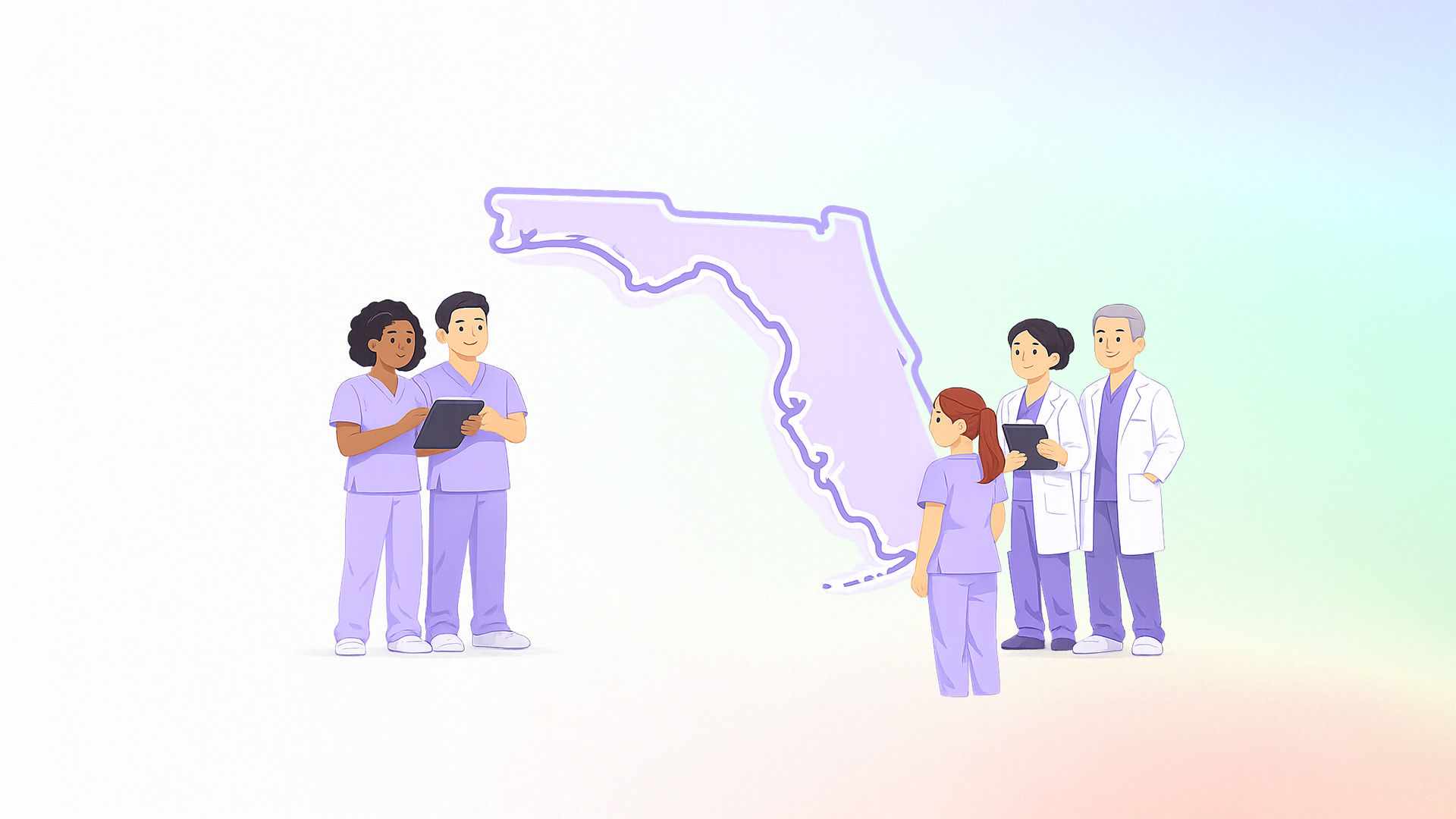Finding a preceptor in Florida is one of the biggest challenges NP students face due to the state’s oversupply of students and limited availability of clinical sites. Clinical rotations are mandatory for graduation, national certification, and licensure, making them a critical step in transitioning from classroom education to real-world nurse practitioner practice.
TL;DR: Finding Preceptors & Clinical Rotations in Florida
- Florida NP students face steep challenges: too many students, too few preceptors, burnout, and heavy paperwork.
- Despite the competition, Florida’s NP job market is growing with strong salaries—averaging $97,368/year and higher pay in cities like Sebring and Port St. Lucie.
- Traditional methods (school lists, cold calls, networking) often lead to delays and frustration.
- NPHub simplifies the process by connecting students with vetted Florida preceptors, handling compliance, and offering flexible payment plans.
- Completing rotations on time in Florida helps students build connections and position themselves strongly for national certification and future job opportunities.
For many nurse practitioner students, securing a Florida preceptor is one of the most stressful steps in their education.
Florida might be known for sunshine and beaches, but for NPs in training, it’s also known for something else: the clinical placement struggle. With a growing number of NP programs across the state, strict licensure requirements, and a shortage of willing preceptors, finding rotations often feels overwhelming.
For NP students clinical rotations put classroom learning into practice, build hands-on experience in treatment and prevention, and develop the leadership skills that will guide them in professional care.
These experiences shape your clinical judgment, confidence, and readiness for national certification. But in FL, securing placements can feel like trying to get an urgent appointment at a walk-in clinic: uncertain, frustrating, and requiring endless patience.
Yet, despite the challenges, Florida remains one of the best places to train as a nurse practitioner. The state ranks among the fastest-growing NP job markets in the country, with thousands of new positions projected in the coming years.
From urban centers like Miami and Orlando to smaller markets offering strong wages and lifestyle balance, Florida provides opportunities for students who can complete their rotations here. With the right approach, and the right resources, you can turn the state’s challenges into a stepping stone for your career.
That’s where NPHub comes in. Instead of spending months emailing clinics or facing unanswered calls, you can gain access to vetted preceptors who are ready to teach and guide you toward graduation. Create your free NPHub account today to find your Florida preceptor and move forward with confidence in your NP journey.
Why Finding a Preceptor in Florida Is So Hard
If you’re an NP student in Florida, you’ve probably already discovered that securing a clinical placement feels less like a step in your education and more like a never-ending obstacle course.
It’s not a lack of effort on your part though, students spend hours emailing clinics, calling offices, and asking for referrals. The real issue lies in systemic barriers that make finding a preceptor uniquely challenging in this state.
Oversupply of Students, Limited Preceptors
Florida is home to dozens of nurse practitioner programs, graduating thousands of new students every year. But the number of available preceptors hasn’t increased at the same rate. The math is simple: there are far more students than there are clinical sites willing to take them.
This shortage creates a bottleneck that leaves students waiting months for a “yes,” while deadlines for rotations and graduation keep moving closer.
Preceptor Burnout and Productivity Concerns
Even when you find a willing preceptor, consistency isn’t guaranteed. Many providers already manage heavy patient loads and face strict productivity expectations. Adding a student can mean longer hours and fewer billable visits, which discourages many from saying yes.
Burnout is real, and when preceptors step back, the shortage grows even worse. Without stronger advocacy from universities or healthcare systems, students often pay the price.
Limited School Support
Another major challenge is the uneven support students receive from their programs. Some universities actively help match students with sites, but many leave the responsibility entirely on the student. Instead of coordinated placements, students are handed a short list of names or told to “start networking.” That often translates to dozens of unanswered emails and weeks of waiting with little progress. Without stronger institutional resources, the search becomes a lonely, frustrating process.
Paperwork, Compliance, and CE Requirements
Suppose you finally secure a preceptor. The process doesn’t end there. Most sites and schools require extensive paperwork: affiliation agreements, immunization records, proof of licensure, background checks, and CE requirementsunique to each program. Every missing signature or delayed approval means more lost time. For many students, managing the administrative side feels like taking on a second full-time job.
The Cost of Delays
Each of these barriers comes with a cost. Every extra month you spend searching is another month paying tuition. Every delay in placement pushes back your chance to sit for national certification. And every postponed rotation means postponing your NP career. What should be an exciting transition from classroom to practice becomes a cycle of stress, uncertainty, and exhaustion.
This is why many Florida NP students are now choosing a different approach—one that removes the guesswork, simplifies the paperwork, and connects them directly with preceptors who are ready to teach. If you’re ready to stop losing time and start moving forward, just like these NP students did, create your free NPHub account, from there, you’ll gain access to vetted Florida preceptors, see real availability, and secure a rotation in days instead of months.
Find NP Preceptors Near You: Florida City Guides
- How NP Students Can Secure Jacksonville Nurse Practitioner Preceptors
- Path to Securing Your Miami Nurse Practitioner Preceptors
- How NP Students Are Finding Tampa Nurse Practitioner Preceptors
- Quick Guide To Secure Orlando Nurse Practitioner Preceptors
Florida NP Market & Salary Trends
Florida is one of the fastest-growing states for nurse practitioners and that growth is only expected to continue. The Florida Center for Nursing projects that by 2037, the NP workforce will increase by nearly 70%, jumping from just over 34,000 practitioners in 2022 to more than 57,000. Demand for services will also rise, but at a slower pace, which means there will be plenty of NPs competing for jobs across the state.
Now, here’s the good news: despite the competition, salaries for NPs in Florida remain strong. The average NP earns about $97,368 a year, or $46.81 an hour. Most fall within the $80,700–$112,100 range, but top earners make well over $130,000 annually.
Location makes a big difference, too. Smaller markets are often where pay is highest. For example:
- Sebring: $121,460
- Port St. Lucie: $119,280
- Gainesville: $114,390
- Panama City: $112,920
- Fort Myers: $111,690
Even larger metro areas like Jacksonville ($109,050) and Daytona Beach ($107,770) remain competitive, giving students flexibility when choosing where to live and practice.
What does this mean for NP students? Florida’s market is full of opportunities, but only for those who complete their rotations on time. Finishing clinicals here not only keeps you on track for graduation, it also helps you build connections in a state where jobs are plentiful and pay is rewarding.
Instead of letting paperwork, delays, and unreturned emails keep you from tapping into this market, take the simpler route. Create your free NPHub account today to connect with vetted Florida preceptors and position yourself for success in one of the nation’s most dynamic NP job markets.
How to Find and Secure a Preceptor in Florida
Every NP student knows they need a preceptor, but the real question is: how do you actually find one in Florida? Students often start with the most obvious routes—school resources, networking, or cold outreach. While these can work, in a state as competitive as Florida, they’re not always enough.
School Resources
Some Florida NP programs maintain relationships with clinical sites, and if you’re lucky, your school may help place you. But many programs provide little more than a short list of clinics or past contacts, leaving the heavy lifting on the student.
Professional Networks and Associations
Joining groups like the Florida Nurse Practitioner Network or the American Association of Nurse Practitioners can open doors. Networking at events or through colleagues sometimes leads to opportunities—but it requires time, persistence, and often the right connections.
Direct Outreach to Clinics
Cold calling hospitals, private practices, or community health centers is another common approach. But many sites are already overwhelmed with student requests, which means you may wait weeks just to get a “no.”
Social Media and Peer Referrals
Some students turn to LinkedIn, NP Facebook groups, or referrals from classmates. While this can be effective, it’s inconsistent, and it doesn’t solve the problem of paperwork, agreements, and compliance once you do find a lead.
In short, the traditional methods take a lot of time, energy, and patience—and they don’t always work. That’s where NPHub comes in. Instead of chasing down opportunities one by one, you can connect directly with vetted Florida preceptors who are ready to teach and already meet your program’s requirements.
Quick Tips for Florida NP Students
If you’re determined to start your search on your own, here are a few ways to maximize your chances of finding a preceptor in Florida:
Start early.
In Florida, competition is fierce. The earlier you begin your search—ideally 6–9 months before your rotation—the better your chances of securing a placement. Waiting until the last minute often means fewer options and more stress.
Be specific in your outreach.
Generic emails rarely get a response. When contacting a clinic or provider, mention why you’re interested in their specialty and how their practice aligns with your goals. A personalized message shows initiative and increases the likelihood of getting a positive reply.
Follow up (without overdoing it).
If you don’t hear back after a week, send a polite follow-up email. Many providers are busy and simply miss the first message. That said, avoid sending repeated requests if there’s still no response—move on to the next lead instead.
Stay flexible.
You may have a dream specialty or location in mind, but flexibility opens more doors. Being open to rotations in different parts of Florida—or in a related specialty—can help you stay on track for graduation instead of waiting for the “perfect” fit.
Leverage referrals.
One of the most effective strategies is to ask classmates, alumni, or faculty if they can connect you with preceptors they’ve worked with. A personal introduction goes a long way in building trust and getting a faster response.
Of course, while these strategies can help, they all take time—and in Florida’s competitive environment, time isn’t always on your side. That’s why so many students turn to NPHub for support. Instead of relying on chance, you can connect directly with preceptors who are already vetted and available.
Create your free NPHub account today and skip the long search. With preceptors ready to teach across Florida, you’ll secure your rotation in days instead of months.
How to Reach Out and Actually Get a Response
Finding a potential preceptor in Florida is only half the battle—the harder part is getting them to say yes. With many providers juggling heavy workloads, your approach needs to be clear, respectful, and professional to stand out.
Keep your emails short and focused.
Preceptors don’t have time to read long introductions. Your message should be simple: introduce yourself, state your program requirements, and explain why you’d like to learn from them. Short and direct increases your chances of being read and answered.
Tips for better outreach emails:
- Use a clear subject line, e.g., “NP Student Seeking Clinical Rotation in Family Practice – [School Name].”
- Keep it to 3–4 short paragraphs max.
- Always include your contact information and availability.
- Proofread—professionalism counts.
Follow up politely.
No response doesn’t always mean no. Many providers simply miss the first email or intend to reply later but forget. A polite follow-up shows persistence without being pushy, and sometimes that’s all it takes to get an answer.
Best practices for following up:
- Wait 5–7 days before sending your second email.
- Keep it shorter than the first—remind them of your request in 2–3 sentences.
- If there’s no reply after the second follow-up, move on. Don’t spam.
Be flexible with scheduling.
Some preceptors may be open to mentoring but can’t commit to your ideal dates. Showing flexibility increases your chances of fitting into their schedule and demonstrates professionalism.
Ways to show flexibility:
- Ask if another block later in the year might work.
- Offer to adjust your clinical hours around their busiest days.
- Indicate you’re willing to travel within Florida if needed.
Leverage peer connections.
One of the strongest tools in your search is a referral. If a classmate, alum, or faculty member trained with a provider, ask if they can introduce you. Preceptors are far more likely to say yes to a student who comes recommended.
How to maximize referrals:
- Reach out to peers who just completed rotations.
- Ask alumni groups or NP associations for introductions.
- Thank anyone who helps you—it leaves a lasting impression.
These strategies can definitely improve your odds, but they still require time and persistence. And in Florida’s competitive landscape, delays can quickly push your graduation off track. That’s why many NP students skip the trial-and-error search and let NPHub handle it for them. We connect you directly with vetted preceptors, take care of the paperwork, and keep your schedule moving forward.
If you’re ready to stop chasing unanswered emails and start focusing on your education, create your free NPHub account today and get matched with Florida preceptors in days, not months.
Take the First Step Toward Your Florida NP Career
If searching for a preceptor in Florida feels overwhelming, you’re not alone. Many NP students describe the process as stressful, frustrating, and discouraging. But it doesn’t have to be this way.
At NPHub we focus exclusively on nurse practitioners, specializing in securing high-quality preceptors quickly and efficiently. Our mission is simple: take the stress out of placements so you can focus on what truly matters: your education, your clinical experience, and your future career.
When you secure a rotation through NPHub, you’re ensuring access to high-quality learning experiences where effective treatment, prevention, and mentorship prepare you for practice.
And because we know that cost matters, we’ve built flexibility into the process. With payment plans designed to fit your budget, you can secure your placement without the financial strain that often comes with delays, extra tuition, or last-minute scrambling.
Here’s what you can expect with NPHub:
- Access to vetted Florida preceptors across multiple specialties.
- Flexible payment plans that keep placements affordable.
- Full support with paperwork, compliance, and scheduling.
- Peace of mind knowing your graduation timeline is safe.
Don’t let placement struggles derail your goals or delay your graduation. The opportunities for nurse practitioners in Florida are strong, but only if you complete your clinicals on time.
Create your free NPHub account and get matched with a preceptor in days, not months. Secure the placement you need, when you need it, with the flexibility and support you deserve.
Frequently Asked Questions: Finding Preceptors & Clinical Rotations in Florida
1. How do I find a preceptor for my NP clinical rotation in Florida?
Most NP students start by checking with their program’s placement office, reaching out to clinics or hospitals directly, or networking through professional groups. While these methods can work, they’re often time-consuming and competitive. Placement services like NPHub streamline the process by connecting you with vetted Florida preceptors who are ready to teach.
2. What requirements are needed for clinical placements in Florida?
Requirements vary by school and site but generally include proof of licensure (or a temporary permit), up-to-date immunization records, background checks, and compliance with CE requirements. Always confirm your program’s specific documentation needs before starting a rotation.
3. Is it legal to pay for a preceptor in Florida?
Yes. Paying for a preceptor is legal in Florida, and it’s becoming more common as the competition for placements increases. Platforms like NPHub make the process transparent, handling all agreements so students can secure rotations with confidence.
4. What specialties are available for NP clinical rotations in Florida?
Florida students can access diverse specialties, including family practice, pediatrics, psychiatry, women’s health, geriatrics, and more. Rotations take place in hospitals, private practices, urgent care centers, and community health clinics, giving you exposure to different patient populations and care models.
5. How competitive is it to secure a preceptor in Florida compared to other states?
Florida is one of the most competitive states for NP placements due to the large number of programs and graduates each year. While rural areas may offer more availability, urban centers often have higher demand and stricter requirements. That’s why many students choose NPHub to save time and secure a guaranteed placement.
6. Why should I use a placement service instead of finding a preceptor on my own?
Finding a preceptor independently can take months and still lead to dead ends. With NPHub, you gain access to a verified network of preceptors, support with paperwork, and even flexible payment plans to make the process affordable. It’s the fastest way to keep your graduation and certification timeline on track.
7. What happens if I can’t secure a preceptor on time in Florida?
Unfortunately, missing a clinical placement deadline often means delaying your graduation. That not only adds extra tuition costs but also pushes back your eligibility for national certification and licensure. Using a placement service like NPHub helps you avoid these delays by guaranteeing a rotation when you need it.
8. How quickly can I get matched with a preceptor through NPHub in Florida?
Most students are matched in just a few days. Because our Florida network is pre-vetted, we can connect you with preceptors who already meet your program’s requirements and have availability. This means you can skip months of searching and move directly into preparing for your rotation.
Key Definitions: Florida NP Clinical Placements
Clinical Rotation
A required period in NP programs where students gain hands-on experience in real healthcare settings—such as hospitals, clinics, or specialty practices—under the supervision of a preceptor.
Preceptor (Florida)
An experienced nurse practitioner or clinician in Florida who supervises NP students, providing education, mentorship, and evaluation during clinical rotations.
Licensure
The process of obtaining legal permission to practice as a nurse practitioner in Florida. Students may need a temporary permit or proof of RN/graduate status before starting a clinical placement.
CE Requirements
Continuing education credits required by both Florida state regulations and NP schools. These ensure students stay current with evolving standards of treatment, prevention, and patient care.
Affiliation Agreement
A formal contract between the NP’s school and the clinical site in Florida. This agreement allows the student to complete rotations at the site and ensures compliance with both institutional and state guidelines.
Compliance Documentation
The paperwork needed before starting a clinical rotation. In Florida, this often includes immunization records, background checks, liability insurance, and proof of licensure.
Placement Services (e.g., NPHub)
Agencies or platforms that connect NP students with preceptors. Unlike general matching services, NPHub focuses solely on nurse practitioners—offering vetted Florida preceptors, handling paperwork, and providing flexible payment plans.
National Certification
The exam-based credential (such as AANP or ANCC) that NP students must pass after graduation to practice. Timely completion of Florida clinical rotations is essential to staying on track for certification.
About the author
- NPHub Staff
At NPHub, we live and breathe clinical placements. Our team is made up of nurse practitioners, clinical coordinators, placement advisors, and former students who’ve been through the process themselves. We work directly with NP students across the country to help them secure high-quality preceptorships and graduate on time with confidence. - Last updated
November 24, 2025 - Fact-checked by
NPHub Clinical Placement Experts & Student Support Team - Sources and references
Find a preceptor who cares with NPHub
Book a rotation.webp)








.webp)


.webp)



%20(3)%20(2).svg)
.webp)